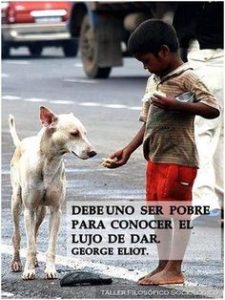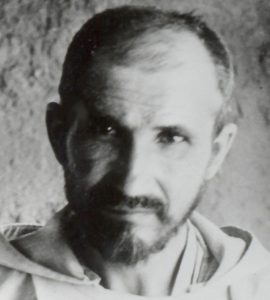Iesus Caritas Priestly Fraternity. Spain.
EASTER RETRAIT 2020
THE LIFE FOR BROTHER CHARLES
The life of the last one
FIRST DAY.
Wednesday, April 15
Reviewing the Song of Philippians (Phil 2,6-11), which we have deepened in these days of Holy Week, and prayed with him, we stand with brother Charles in his learning of selflessness, as the disciple who learns from his teacher: “He descended: he descended all his life, descending when he became incarnate, descending when he  became a little boy, descending obeying, descending becoming poor, abandoned, exiled, persecuted, executed, always putting himself in last place ”. Charles de FOUCAULD, “Spiritual Writings ”.
became a little boy, descending obeying, descending becoming poor, abandoned, exiled, persecuted, executed, always putting himself in last place ”. Charles de FOUCAULD, “Spiritual Writings ”.
The aristocrat becomes a servant, the lord of the castle goes to live in the village, he takes off his title and becomes a brother. How can we understand the last place if we stay in the usual place or even try to climb, climb positions? How many times do we deceive ourselves into thinking that we are already humble?
 The imitation of Jesus, as Charles de FOUCAULD’s teaching and constant desire from his conversion, we know that it consists in praying, working, loving, accompanying, forgiving, as Jesus did, and also being happy as he was, showing the Father’s mercy, in every gesture, every word. “Mercy is not manufactured: it is received. The gift of God is not bought, is not sold, does not return the call. Give freely without expecting anything, without anyone losing hope. Risk loving until the end ”. Jacques GAILLOT in “Happy the merciful”, September 10, 2016 at iesuscaritas.org
The imitation of Jesus, as Charles de FOUCAULD’s teaching and constant desire from his conversion, we know that it consists in praying, working, loving, accompanying, forgiving, as Jesus did, and also being happy as he was, showing the Father’s mercy, in every gesture, every word. “Mercy is not manufactured: it is received. The gift of God is not bought, is not sold, does not return the call. Give freely without expecting anything, without anyone losing hope. Risk loving until the end ”. Jacques GAILLOT in “Happy the merciful”, September 10, 2016 at iesuscaritas.org
Surely we are experiencing these days of “living in the hidden”, confined, with nothing on our agendas, with the sails of our ships folded, waiting for a favorable wind, a very special Nazareth style.
The call to be missionaries must be permanently in our hearts; not participating in people’s lives, visiting the sick, receiving friends and people who come to our homes, and so many things that we cannot do during this pandemic, can help us review the meaning of the mission. It is very likely that we miss others, as we miss ourselves in a normal situation. We have become the last by imposition. We must be the last because our Master was made that way, and that’s how we learn it every day.
All of this makes us more aware of the realities of our world. We live in a comfortable Europe that is reeling, a Europe closed in on itself: “The Europe of the peoples is about to be built. It is the meaning of history. Sacrificing men for the sake of the economy, leaving the Third World countries aside, will not become the Europe of the peoples. What will be the future of immigrant communities? It seems to me in the Maastricht Treaty that immigrants pay the duck for a strong Europe that gives a little more height to its walls.”
Jacques GAILLOT, “I take liberty …”, Nueva Utopía
This Europe, which is going to suffer an economic crisis that we do not yet know its scope, which is going to be the humanitarian crisis of so many people – which really is the world of the last, those who have always been last – will learn to be in their instead, to know how to listen better, to apply a policy of looking less at the navel and looking at the world without fear. Something like this can happen in North America … And, as a Church, we could say the same.
 From the small, which has always been unimportant to the richest, brother Charles builds a dream. It was something that he did not see realized, as an unattainable utopia – a challenge of the Kingdom – and yet, we are appreciating it, because it helps us in our lives to live simply, to share, to be fraternity, not to look no one above us, not to be submissive to fierce consumption, or as priests, to celebrate the faith of the people, of which we are part, without fuss or complicated rituals, being part of the history of people’s lives because they are important to us. “In solidarity with the poor. This Easter has its own color. Our personal ambiguity appears a little clearer illuminated by the poor. Some who walk with Jesus are disconcerted by the words of denunciation and the demand for their rights and, consequently, they want to silence the voice of the poor and those who show solidarity with them. The oppressed are also afraid of dying in the desert like the Jews, and they ask us for what we have. History, with its setbacks and darkness, leads us to lose sight of the God who seems lost and distant on the mountain, while beside us emergency idols made of shiny gold are made.” Benjamín GONZÁLEZ BUELTA, “Go down to meet God. The life of prayer among the poor ”, Sal Terrae
From the small, which has always been unimportant to the richest, brother Charles builds a dream. It was something that he did not see realized, as an unattainable utopia – a challenge of the Kingdom – and yet, we are appreciating it, because it helps us in our lives to live simply, to share, to be fraternity, not to look no one above us, not to be submissive to fierce consumption, or as priests, to celebrate the faith of the people, of which we are part, without fuss or complicated rituals, being part of the history of people’s lives because they are important to us. “In solidarity with the poor. This Easter has its own color. Our personal ambiguity appears a little clearer illuminated by the poor. Some who walk with Jesus are disconcerted by the words of denunciation and the demand for their rights and, consequently, they want to silence the voice of the poor and those who show solidarity with them. The oppressed are also afraid of dying in the desert like the Jews, and they ask us for what we have. History, with its setbacks and darkness, leads us to lose sight of the God who seems lost and distant on the mountain, while beside us emergency idols made of shiny gold are made.” Benjamín GONZÁLEZ BUELTA, “Go down to meet God. The life of prayer among the poor ”, Sal Terrae
Easter, this Easter in solitude, in domestic Nazareth, is an opportunity to enjoy again the little things, the good news, the friends or the family that we miss.
Easter places us in the context of the joy of the little ones, the last ones, where Jesus is always present, with his door open to be invited to the table of the poor, or the curtain drawn because there is no door. Let’s not pass by, thinking of better places. The adoration of Jesus is now that humble house where to be with him, with all the poor of the world, before whom we do not need words.
Let us now make a time of adoration. Not to think about what I have written, but to look at Jesus, the one who became the last and was the Beloved of brother Charles.
For our life review::
1 Do I live my life more (time, work, availability, personal resources, potentialities …) for myself than in function of my missionary being, of my dedication to others? Why and in what ways?
2 In the confinement and pandemic that I have lived, what have I learned from my own inner experience and from the experiences, values, pain, life and death from outside?
3 Easter, like all Good News announced to the poor, in what aspects, attitudes or approaches of my life is a conversion, a change, a call? Can I imagine it or am I living it?



